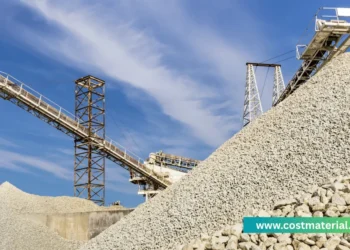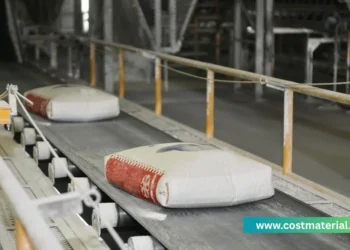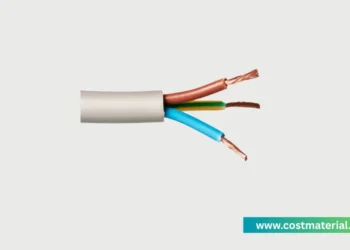Nails are one of the most essential yet often overlooked materials in construction. Whether you’re building a house, installing roofing, or doing woodworking, choosing the right type of nail—and knowing the latest prices—can save you time and money. In this blog post, you will learn the updated nail price list in the Philippines for the year 2025. But before we dive in to the unit cost, lets learn first what is nail, its different types, uses and importance.
What Are Nails?
Nails are among the most fundamental fasteners in construction, woodworking, and DIY projects. These small but essential metal pins secure materials like wood, roofing sheets, and drywall, ensuring structural stability. Unlike screws, nails rely on friction and shear strength rather than threading, making them ideal for permanent or heavy-duty applications.
Types of Nails and Their Uses
1. Common Wire Nails
Description: General-purpose nails with a smooth shank and flat head.
Uses: Framing, rough carpentry, and temporary construction.
Why They Matter: Affordable and widely available, but lack corrosion resistance unless galvanized.
2. Roofing Nails
Description: Short, thick nails with a wide, flat head and often galvanized.
Uses: Attaching asphalt shingles, metal sheets, or waterproofing membranes.
Why They Matter: Their large heads prevent tearing, while galvanization resists rust from weather exposure.
3. Finishing Nails
Description: Thin, small-headed nails designed to be countersunk.
Uses: Trim work, cabinetry, and furniture where visible nail heads are undesirable.
Why They Matter: Provide a clean, polished look without splitting delicate wood.
4. Concrete Nails (Masonry Nails)
Description: Hardened steel nails with fluted or grooved shafts.
Uses: Fastening wood to concrete or brick (e.g., door frames, wall anchors).
Why They Matter: Can penetrate tough materials without bending.
5. Duplex Nails
Description: Double-headed nails (one head for driving, another for easy removal).
Uses: Temporary structures like scaffolding or concrete forms.
Why They Matter: Allows disassembly without damaging materials.
6. Brad Nails
Description: Ultra-thin, small-gauge nails for nail guns.
Uses: Moldings, lightweight trim, and crafts.
Why They Matter: Minimize splitting and leave nearly invisible holes.
7. Upholstery Nails (Decorative Nails)
Description: Ornamental nails with decorative heads (brass, copper, etc.).
Uses: Furniture, leatherwork, and interior design accents.
Why They Matter: Combine functionality with aesthetic appeal.
Why Nails Are Indispensable in Construction
Structural Integrity – Nails distribute weight evenly, preventing joints from loosening over time.
Cost-Effectiveness – Cheaper than screws or adhesives for large-scale projects.
Speed & Efficiency – Faster to install than screws, especially with pneumatic nail guns.
Versatility – Different types cater to specific needs (e.g., weatherproof roofing nails).
Historical Reliability – Used for centuries, proving their durability in long-term structures.
Choosing the Right Nail
Material: Galvanized or stainless steel for outdoor/moisture-prone areas.
Length: Should penetrate at least 2/3 the thickness of the material being secured.
Coating: Vinyl or epoxy coatings enhance grip and corrosion resistance.
From building houses to crafting furniture, nails remain a cornerstone of construction. Understanding their types and applications ensures you select the best fastener for durability, safety, and efficiency.
Average Nail Price List 2025 (Philippines)
| Item | Brand/Type | Size | Unit | Price (PHP) |
|---|---|---|---|---|
| Common Wire Nails (Galvanized) | ||||
| Common Nail | Eagle Brand | 1" | kg | 65 - 85 |
| Common Nail | Puyat Steel | 2" | kg | 75 - 95 |
| Common Nail | Orocan | 3" | kg | 85 - 110 |
| Common Nail | Steeltech | 4" | kg | 95 - 130 |
| Roofing Nails (Galvanized) | ||||
| Roofing Nail | Eagle Brand | 1.5" | kg | 90 - 120 |
| Roofing Nail | Puyat Steel | 2" | kg | 100 - 140 |
| Concrete Nails (Hardened Steel) | ||||
| Concrete Nail | Steeltech | 2" | kg | 110 - 150 |
| Concrete Nail | Orocan | 3" | kg | 130 - 170 |
| Finishing Nails (Bright/Stainless) | ||||
| Finishing Nail | Senco | 1" | kg | 120 - 160 |
| Finishing Nail | Bostitch | 1.5" | kg | 130 - 180 |
| Duplex Nails (Double-Headed) | ||||
| Duplex Nail | Puyat Steel | 2.5" | kg | 100 - 140 |
| Brad Nails (For Nail Guns) | ||||
| Brad Nail | Bostitch (Pack) | 1" | pack | 60 - 90 |
| Brad Nail | Makita (Box) | 1.5" | box | 200 - 300 |
| Upholstery & Decorative Nails | ||||
| Decorative Nail | Generic Brass | 0.5" | pack | 150 - 250 |
| Upholstery Nail | Antique Finish | 1" | pack | 200 - 350 |
(Note: Prices may vary per supplier, location, and bulk purchases)
Need an Excel copy of this table? Download here
Additional Notes:
Price Factors:
Galvanized nails are ~10-20% more expensive than plain steel due to rust resistance.
Branded nails (Bostitch, Senco, Makita) cost more but offer better durability.
Concrete nails (hardened steel) are pricier due to material strength.
Factors Affecting Nail Prices in 2025
Material Type
Galvanized nails (rust-resistant) cost 10-20% more than regular steel nails.
Stainless steel nails are pricier but ideal for outdoor use.
Brand Reputation
Premium brands like Bostitch, Senco, and Makita are more expensive but offer better durability.
Local brands (Eagle, Puyat Steel) are budget-friendly and widely available.
Inflation & Supply Chain
Due to rising material costs, nail prices have increased by 5-8% compared to 2024.
Tips for Choosing the Right Nails
🔹 For Woodworking: Use finishing nails (smooth, minimal damage).
🔹 For Roofing: Choose galvanized roofing nails (rust-resistant).
🔹 For Concrete/Masonry: Pick hardened concrete nails.
🔹 For Nail Guns: Use brad nails or coil nails for efficiency.
Final Thoughts
Keeping up with the latest nail prices ensures you stay within budget for your construction projects. Prices may vary slightly depending on location, so it’s best to check with local hardware stores before purchasing.
Did you find this guide helpful? Share it to others! For more construction material price list, check our other blog post.





